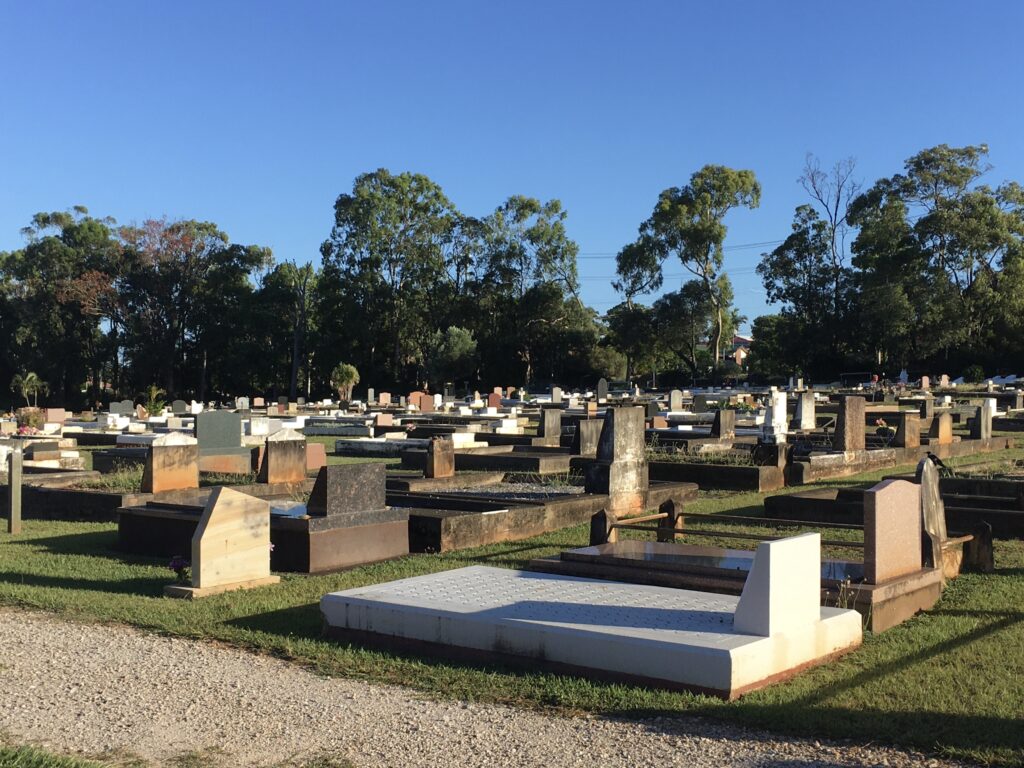I have just been released from hospital after being admitted into the Emergency Department for a heart condition. Lying in a hospital bed quickly helps one to think seriously about life. And writing an article like this takes on deeper meaning. Life is fragile – here today, gone tomorrow. Fortunately, the doctors brought my irregular heart rhythm under control – and, for now, I have a new lease on life. The experience was a wake-up call.
The Redlands Hospital is close to the Cleveland Cemetery with its old graves and tombstones, as well as newer burial sites. Memories returned to fifty years ago, while I was studying at Teacher’s College and had room and board at a widow’s home. Each Saturday, the widow visited the cemetery with fresh flowers to place at the tomb where her late husband had been put to rest. She invited me to accompany her – and for me as a young student, it became an important introduction to death and dying.
Today it seems, few families regularly visit a cemetery to pay respects to their loved ones. Over the past couple of years, I have rediscovered benefits that visiting a cemetery can provide:
(1) Purifying one’s soul and spirit
Recently, on a late summer Saturday afternoon, under a cloudless blue sky, I had revisited Cleveland Cemetery. The peaceful grounds are dominated by traditional burial plots. Additionally, there is a centrally located cremation garden columbarium. Walking alone through the quiet cemetery grounds felt purifying for my soul and spirit in that I was getting closer to the reality of life as it is – without the continual distraction of media influences and non-essential pursuits.
(2) Seeing life in a truer perspective
Nowadays, newer cemeteries, such as the Great Southern Memorial Park in Carbrook, are semi-rural with spacious grounds and attractive landscaping. In the quietness of such settings, life is seen in a more meaningful perspective – and one begins to grasp what truly counts. (The words of the song by Johnny Nash, “I Can See Clearly Now” [1972], are fitting.)
(3) Viewing others with greater love and compassion
Love and compassion welled up within me as I reflected on the lives of people across the lifespan – now lying buried in the graves before me – infants, toddlers, children, adolescents, adults, seniors, and the aged. All lived their lives in the best way they knew how – seeking happiness and not wishing to suffer. And yet, unexpectedly, some lives were tragically snuffed out in untimely accidents, mishaps, disease, or war.
(4) Realizing that we are all participants in life and death
During our eight years living in the Czech Republic in the 1990s, on our way to teaching in Jindrichuv Hradec, we would pass a cemetery on the gate of which was written: “As we are, you too shall become.” We are all participants in life – and no-one stands above dying and leaving this earth. This fact takes on greater reality in a cemetery setting. When children and teens accompany their parents on a cemetery visit, they too begin to realize that death is a part of life. (Of course, when someone close dies suddenly and unexpectedly, there will always be shock and grieving.)
(5) Having a realistic view of dying and parting for couples
A quiet cemetery setting can be wonderfully conducive for heart-to-heart talks between husbands and wives. Topics rarely touched on or covered in the busyness of daily routine can be opened– matters such as the final events of two lives shared, the reality of one partner needing to leave ahead of the other, and the hope that in the overall scheme of things, all will be taken care of as well as possible at the time of departure.
Leaving the hospital, not far from the cemetery, that Sunday afternoon, I realized that visiting a cemetery need not be a morbid experience or a depressing outing. Rather, it leaves one better connected with life, as well as having a more realistic view of the time of one’s departing.
Better to go to the house of mourning
Than to go to the house of feasting,
For that is the end of all men;
And the living will take it to heart.
(Ecclesiastes 7:2)
Death is real.
It comes without warning.
It cannot be escaped.
(Leonard Cohen)
“What is the greatest wonder in the world?
That, every single day, people die,
Yet the living think they are immortal.”
― Krishna-Dwaipayana Vyasa, Mahabharata
Written by Alexander Peck. Edited by Eva Peck. (February, 2021)

Visiting a cemetery can help one to:
Purify the soul and spirit
See life in a truer perspective
View others with greater love and compassion
Realize that we are all participants in life and death
Have a realistic view of dying and parting as a couple
